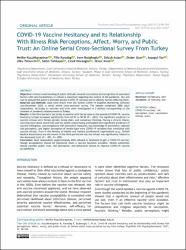COVID-19 vaccine hesitancy and Its relationship with illness risk perceptions, affect, worry, and public trust: An online serial cross-sectional survey from Turkey

View/
Access
info:eu-repo/semantics/openAccessDate
2021Author
Küçükkarapınar, MelikeKaradağ, Filiz
Budakoğlu, İrem
Aslan, Selçuk
Uçar, Önder
Yay, Ayşegül
Timurçin, Utku
Tümkaya, Selim
Hocaoğlu, Çiçek
Kiraz, İlknur
Metadata
Show full item recordCitation
Kucukkarapinar, M., Karadag, F., Budakoglu, I., Aslan, S., Ucar, O., Yay, A., Timurcin, U., Tümkaya, Sçi Hocaoglu, C. & Kiraz, I. (2021). COVID-19 Vaccine Hesitancy and Its Relationship With Illness Risk Perceptions, Affect, Worry, and Public Trust: An Online Serial Cross-Sectional Survey From Turkey. Psychiatry and Clinical Psychopharmacology, 31(1), 98-109. DOI:10.5152/pcp.2021.21017Abstract
Objective: A better understanding of public attitudes towards vaccination and recognition of associated factors with vaccine hesitancy or refusal is important regarding the control of the pandemic. Our aim was to analyze the public's attitudes toward COVID-19 vaccines and to identify factors affecting them.
Materials and Methods: Data were drawn from the Turkish COVID-19 Snapshot Monitoring, between July-December 2020, a serial online cross-sectional survey. The sample comprised 3888 adult respondents. Attitudes to vaccines and trust were investigated in 3 periods corresponding to the timeline of pandemic-related events in Turkey.
Results: In the third period of our study, in parallel with the increase in the spread of COVID-19, vaccine hesitancy/refusal increased significantly from 43.9% to 58.9% (P < .001). The significant predictors of vaccine refusal were female gender, being elder, and conspiracy thinking. Having a chronic illness, worrying more about loved ones and the health system being overloaded were significant predictors of vaccine willingness. Less compliance with preventive measures, less knowledge of prevention, reduced risk perception, and higher perception of media hype were COVID-19 variables that correlated with vaccine refusal. Trust in the Ministry of Health and medical professional organizations (e.g., Turkish Medical Association) was the lowest in the third period and vaccine refusal was significantly related to the decreased trust (P < .001, P = .002).
Conclusion: Most respondents (approximately 60%) refused or hesitated to get a COVID-19 vaccine, though acceptability should be monitored when a vaccine becomes available. Health authorities should consider public trust, risk perception, and behavioral factors to improve COVID-19 vaccine acceptability.

















